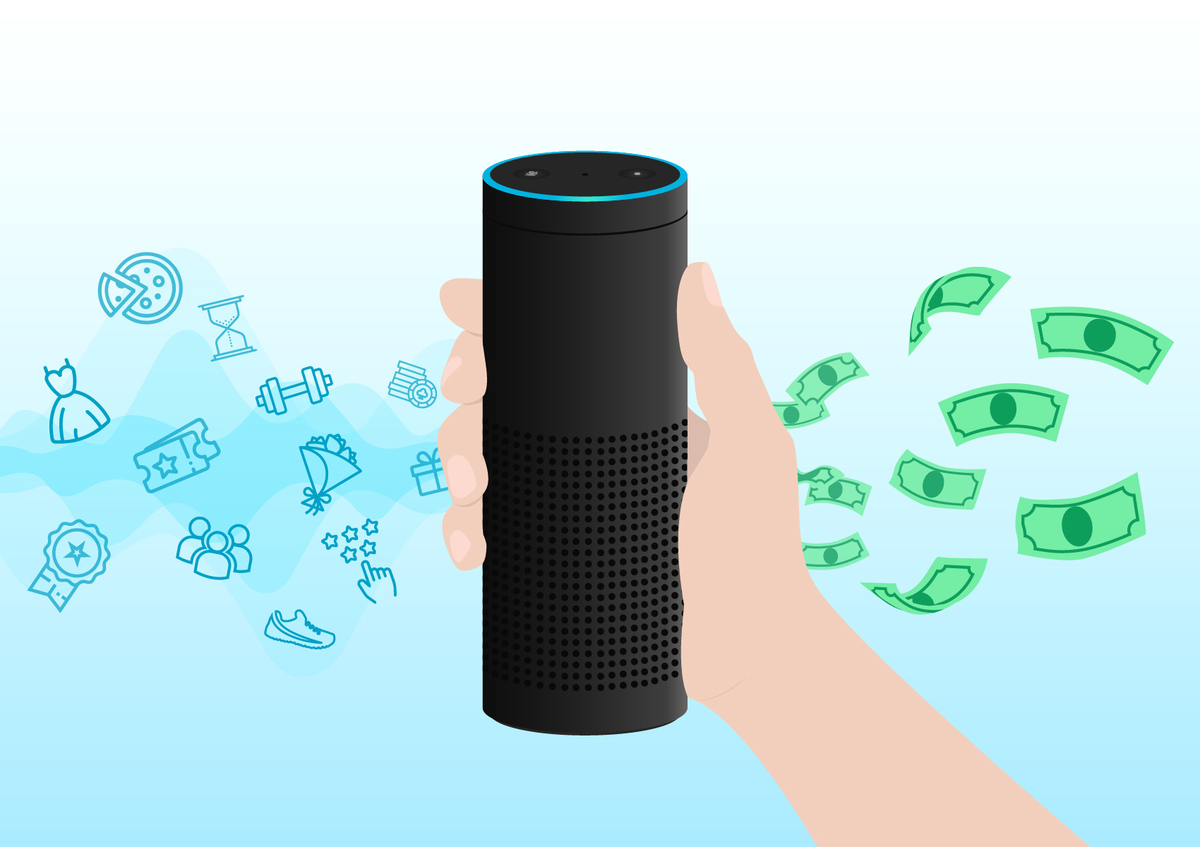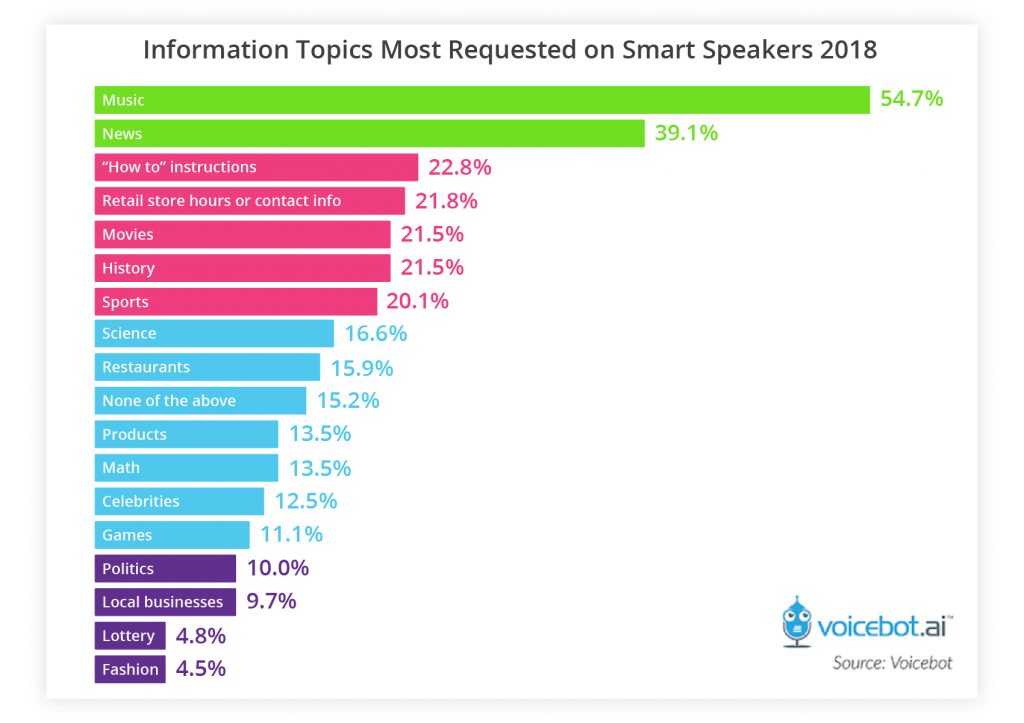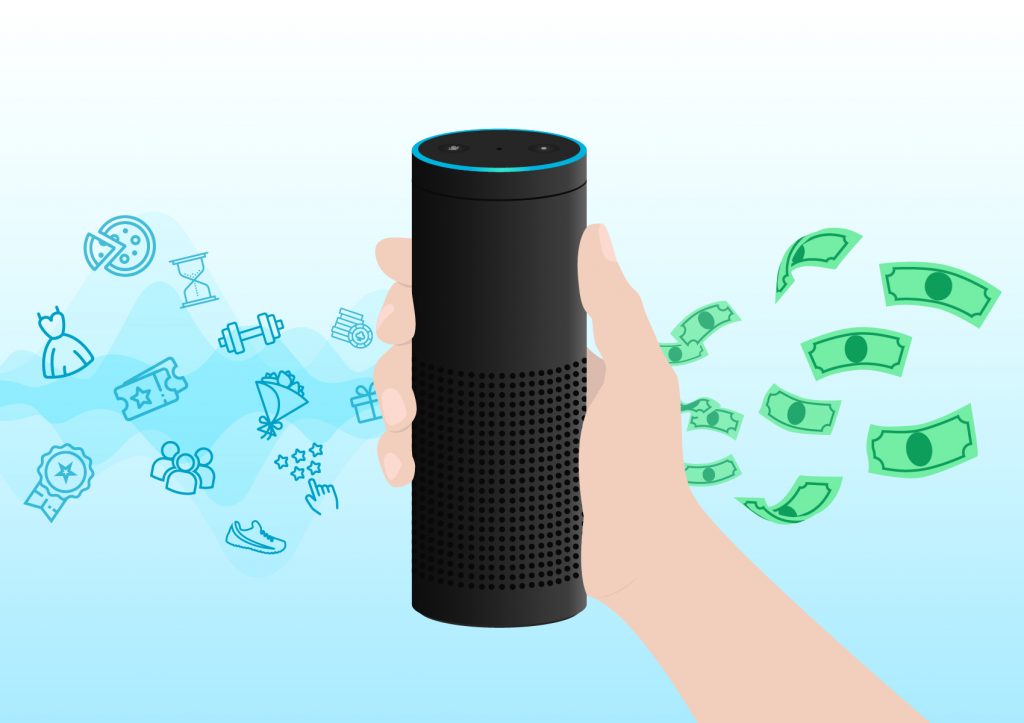How You Can Make Money with Amazon Alexa Skills

Amazon is expanding its voice assistant Alexa into millions of households and workplaces. Smart devices like Amazon Echo, Echo Show or Echo Spot enable customers to interact with compatible hardware and to access flash briefings, games, recipes, and other services. These abilities, known as skills, seem to be limitless. There are over 50,000 Amazon Alexa skills already. Each one makes Alexa smarter and more useful for consumers. The more popular it gets, the more Alexa-enabled gadgets Amazon sells. The circle is closed.
Free subscriptions facilitated Amazon’s early leadership with the most voice apps. However, many indie developers who create skills for Alexa felt they couldn’t build viable businesses off the platform. Some have given up. Since May 2017, Amazon has offered creators three ways to earn money off useful skills. Let’s take a look at the monetization options available currently and possibly in the future.
Ways to Make Money with Amazon Alexa Skills
Alexa Developer Rewards Program
The program rewards Alexa developers who have created the most popular and well-received voice experiences. Currently, the following skill categories qualify for direct payments:
- Education & Reference
- Food & Drink
- Games, Trivia & Accessories
- Health & Fitness
- Kids
- Lifestyle
- Music & Audio
- Productivity
The Amazon Alexa team measure customer engagement for all of the skills every month. They consider the minutes of usage, new customers, recurring customers, customer ratings, sessions, and more. Based on these factors, they select the top performing custom skills to be rewarded. The amount of money paid as a reward is based on customer engagement as well. For the highest engaging skill published, say, in the US, UK, and Germany, the developer will be paid for each geography.
If your Alexa skill qualifies, the Alexa team will send you an email by the middle of the following month. It will include the amount of your payment (for each skill/geography, if applicable). You will receive the money by the end of that month, provided that your payment and tax info in the Amazon Alexa Developer Portal is up to date.
Amazon claims to have paid out millions of dollars as reward money. The winners published their skills in the U.S., U.K., Canada, Germany, Japan, and India. Some of the skills had started just for fun and ended up earning the creators over $30,000 in six months. Some have been receiving checks for $5K-9K per month. A few have made over $100,000 already.
The secret is to create delightful and useful user experiences to which people return and share with friends. Developers can potentially reap more rewards by:
- improving the in-skill experience;
- updating it with fresh content;
- making it available to more customers around the world.
If your skill is not in the eligible categories, you may resubmit, maybe selecting a less competitive category to maximize your payout.

Skill developers can monitor customer reviews in the Alexa Skills Store and customer engagement data in the Amazon Alexa Developer Portal. (In the Alexa Skills Kit section which lists your skills, click the Metrics link for each skill to see data about customers and sessions.)
Additionally, developers with a published skill in any category can apply for an AWS promotional credit equivalent of $100. Once approved, the applicant will be eligible to receive them monthly for one year. AWS promotional credits are not a reward: they can be applied only to AWS usage charges for the skill. However, this allows developers to build and host skills at no cost.
The problem is that these are not formal monetization programs. There’s no certainty whether a skill will be top-dog next month. There are complaints about the lack of transparency and unpredictable payouts through the Alexa Developer Rewards. The good news is that skills can compete for rewards while exploiting other monetization opportunities.
In-Skill Purchases
The monetization model was initiated in a developer preview program in November 2017. In-skill purchasing (ISP) is similar to in-app purchases in the mobile world. ISP allows selling premium content or digital subscriptions within an Alexa app. The premium content can include:
1. virtual game products: expansion packs, special powers or equipment, custom characters, and more;
2. add-on content: one-time purchases of interactive stories, consumables, or subscriptions to premium content;
3. unlocked features and functionality for online services, e.g., multiple accounts.
The core Alexa skill experience should not change, and none of the formerly free content should be put behind a paywall. For example, Sony sells a subscription to Double Jeopardy! with extra clues each weekday. There’s free daily content that drives customer engagement. When it runs out, additional content is offered so users don’t have to wait until the next day to play more.
Alexa developers define their premium offering and price, set up tax forms for payment purposes, and submit the ISP to Amazon for certification. The purchasing flow with the payment options associated with the user’s Amazon account is built-in. Amazon also provides the tools to manage in-skill products, optimize their sales performance over time, and measure skill usage and earnings. Developers will be paid 70% of the list price before any discount offered by Amazon. (Amazon may be considering what split it wants to take on these deals through experimentation.)
The main tricks about ISP implementation appear to be:
1. how to add value to quality skills and convince users to sign up for premium content;
2. when, where, and with what frequency to prompt for an upsell.

Amazon Pay for Alexa Skills
This monetization solution became available broadly in 2018. Previously, Amazon didn’t allow third-party skill developers to sell physical products from within an Alexa skill. Consumers had to exit the skill and make an order from Amazon through Alexa.
Amazon Pay lets Amazon account holders use the payment methods already associated with their accounts. They can pay for goods or services and make donations. Amazon Pay for Alexa skills enables them to do that through a company’s custom skill without having to enter their username, password, shipping address or credit card info. The user has to grant the skill permission to use Amazon Pay as their default payment. That allows the skill to retrieve their payment details from the Amazon account.
Brands and merchants can sell food, clothing, electronics, print magazine subscriptions, event tickets, flower delivery, hotel reservations, gym memberships, and more. For example, Atom Tickets tells customers what movies are playing nearby. They can purchase movie tickets without leaving the voice experience. After the payment has been processed, the customer receives a confirmation via the companion Alexa App and email.
An entity looking to create a similar Alexa skill has to register with Amazon Pay in the appropriate region. Once their skill is ready, they set up the payment workflow and add Amazon Pay to the skill. Amazon Pay integrates with existing customer relationship and order management systems. Thus businesses can continue managing their sales as part of the current process. Every skill requires certification before it is added to the Alexa skills store.
Amazon Pay charges companies a processing fee for each transaction. It varies by region. In the U.S., businesses pay a 30 cent authorization fee and 2.9% transaction fee.
Future Monetization Tools?
So far, Amazon has been preoccupied with expanding Alexa customer base. To ensure the customers get a delightful ad-free experience, the corporation strictly forbids individual developers to include advertisements in their Alexa skills. However, the smart speakers market dominance combined with Alexa’s helpful personality makes the platform a plausible competitor to Google and other digital advertising companies.
Alexa’s Q&A feature may be Amazon’s foray into voice advertising. Alexa might hand off common consumer questions to sources with a vested interest in the answer. Amazon, in that case, could conceivably charge companies to supply branded answers. The companies’ awareness of Alexa and other voice platforms is growing. Marketers hope to be able to serve ads soon, but probably we won’t see in-skill advertising among Alexa’s monetization tools this year.
Nearly all Alexa skills today are free to install: Amazon doesn’t let most developers charge consumers. If it does someday, those who already have a top-performing engaging custom skill will have an advantage. They can also funnel their already-built customer base toward a new paid skill.
Conclusion
The ecosystem and economy around Alexa are growing fast. Alexa is compatible with 20,000 devices from over 3,500 brands now. Amazon is working hard to foster the conditions for independent developers, Alexa tools makers, and marketing companies. The platform needs all of them to generate Alexa skill ideas, innovate, and extend Alexa capabilities at a rapid pace. Direct payments to Alexa developers and publishers should fuel the growing voice app economy.
Cash payments for top Alexa skills can draw in more developers to create better and more complex skills. With in-skill purchases, developers can earn money by offering extra content or premium versions of a skill. Amazon Pay for skills provides a new sales channel for brands and merchants.
The latter two are reliable monetization tools, but some feel that “organic” monetization solutions, such as advertising and paid skills, are vital for the health of the platform and third-party developers.
The smart speakers market will be evolving rapidly in the next few years. It will increasingly attract companies considering a move into the space. Simultaneously, Amazon is sure to invent, offer and test new ways to make money off Alexa skills. The voice assistant market is going to explode like web development and mobile app development had exploded. There is much upside for developers looking to create voice-first businesses with Alexa and for tech startups that aspire to partner with e-commerce giants.
Do you need help with integrating Alexa into your business? Contact Alternative-spaces!
Content created by our partner, Onix-systems.
 Home
Home